Long gone are the days of Jean-Michelle and Coach Larry sussing each other out. Jean-Michelle said himself, without the help of Girl and Coach Larry, he never would have skated in the Malibu contest: Mister Larry recognized that the kid had heart. So here we are 20 years on, trying to make sense of it all. What Spike Jonze describes as an inside joke. Lots of cake, Owen Wilson’s struggle with Shakespearean-like dialogue and the rest of Hollywood still left scratching their heads wondering who Rick Howard is. All stemmed from spontaneity of course. Enjoy –
Photography provided by Girl and scans provided by Chops =0
Words by Stephen Cox
I’m feeling quite nervous about this for a couple of reasons. One being you’ve had so many interviews with weird twists. Do I have anything to be worried about?
Well unfortunately you’re not in the room so I can’t stab you. So you don’t have to be nervous about that. You’re going to get through this interview.
[Laughs].
That’s a good thing, right?
Definitely. The other reason is you and pranks. I was going to ask for a Crailtap style top 5 but that’s too many to ask for on the spot.
Somehow whenever there is a birthday cake or it is somebody’s birthday I’ll forget and of course, I’ll have half of it end up in my face from Rick. It’s almost like somehow I’ll forget every time. The last time was when we were doing Pretty Sweet and we were at Lance Mountain’s house; we were shooting some stuff in his house at the pool in his backyard. I fell asleep, which already wasn’t the smartest thing to do. I fell asleep on the chair and I woke up and they were singing happy birthday with a cake and I was kind of dazed anyway. Then the cake was handed to me. I was looking at it thinking, “that’s weird, there’s a big piece cut out of it” and as soon as I put it together Rick came from behind me and smashed a piece in my face.
[Laughs].
Actually, I think that happened when we were filming the opening of Fully Flared with the explosions in the big empty lot in Downtown LA too. Oh no, I didn’t get the cake. Rick got it in his face that day.
Hard distinguish, it happens that much.
I think so yeah. It’s the go-to.
Cake, celebrations, 20 years. Congratulations.
Thanks. We’re amazed that we here at 20 years. It’s incredible.
How was the art show?
That was really amazing. Andy Jenkins, Hershel [Baltrotsky], Rick and others at Girl spent months and months going through all the archives; the boards, the photography. It was curated incredibly. When you walked into the gallery on the left there were photos going from 1993 to 2013. On the right side there were boards from the 20 years. It was amazing to look at the photos and boards, the trajectory of the company and who we have done it all with. It was a family of everybody; Jovontae [Turner] was there, [Sean] Sheffey was there, and I hadn’t seen them in a long time. It’s so amazing that we started the team 20 years ago with 8 pros and 4 of them are still skating: Rick, Mike [Carroll], Guy [Mariano], Eric [Koston]. Jeron [Wilson] too. He came on really soon after. I think that’s pretty amazing.
It is. Looking at the walls must have brought back some forgotten memories.
There were so many photos that I had forgotten even existed. Like shooting with Guy. There was a photo that I shot of him doing a switch 360 flip over a gap with his laces untied and it was pretty early on when we started Girl. I totally forgot about being around everybody that day.
You knew him from a very young age too.
I probably met him around World. We met up there a lot to get boards and then go and skate. When Rudy [Johnson] and Guy got on Blind I was skating with Mark [Gonzales] and Jason [Lee] a lot right around when we started shooting the video.
What was he like back then?
Guy was always really quiet but you could tell he knew what was going on. He was 14 I guess, but he was really small so he looked around 11 or 12, He was always the youngest but kind of the coolest, you knew he was checking everything out but not really saying anything. Every now and then he would say something funny, his little comments. He had a very clear idea of what he thought was good and bad or cool and not cool. He was entertained by it all. We’d go by and pick him up and [laughs] the funny thing I remember him saying one day, “Oh shit, I forgot my shirt.” He’d been wearing the same Powell Supreme shirt and had told me he’d been trying to wear it a lot so it looked like all his stuff was done on the same day [laughs].
[Laughs] I think we should find out how you met Rick too. You were living with Megan [Baltimore] at the time weren’t you?
Yeah, Rick just started showing up at the house a lot. I didn’t really know him. He was a San Diego and Plan B guy; we didn’t really skate with them too much so I didn’t really know him. But then he was around the house and I would see his backpack and think, “oh that’s weird, Rick Howard’s here” and he had a really bright blue neon Acura parked out front. At first, I was like, “hey, how’s it going?” We were kind of checking each other out then after a couple of weeks of that we started hanging out a lot and skating. We went from checking each other out to becoming best friends. We’d skate at the school a block away from our house.
The formation of Girl came soon after where the importance of having fun skating came to the foreground. How did you feel at the time?
That was basically it. I’d made a few videos at World and was shooting their ads from the beginning when it was SMA but kind of wasn’t feeling it much myself anymore, things had changed a lot. It was feeling a little darker and I wasn’t really hanging out that much over there. I started getting more into videos.
When did you all decide?
I think we got to talking one day at a party at G-Son which was the Beastie Boys’ studio in Atwater Village. It was almost like an old community centre with a basketball court, which had been turned into a studio. I was at the party with Rick, Megan and Mike and I guess we had already been kind of talking about it. Rick was getting more serious about it and wanting to do something. I was like, “let’s do it.” He was also thinking of maybe doing a label at one of the other skateboard companies and I told him that I thought if he did that it would just end up being somebody else’s thing and he wouldn’t have control over it. I think that’s how I helped, though I don’t know how much help I really was [laughs]. But we decided right there to do it. Our friend had a store called X-Large and I thought maybe we could get them to distribute it so we don’t have to start by getting a whole warehouse set up. I was like, “let’s go find those guys” and we did. They were like, “sure!” We were all 22 or something and decided to make our own skateboard company.
And here you are today. Were you thinking about risks?
It was just the right thing to do. Nobody wanted to be at World anymore. Rick, Mike, Eric [Koston] and everybody wanted to skate together and do something that felt like what we thought skateboarding was. To us. We did it without much thought or looking back.
You caught out World selling Girl boards as well didn’t you?
Oh yeah, I forgot about that.
Did they own up eventually?
[Laughs]. They didn’t own up to it. We called them and they said, “no, no, we’d never do that.” So we said, “that’s weird ’cause we were there this morning taking polaroids and I think it’s illegal to sell someone’s copyrighted product.” I didn’t really know what I was saying or have a lawyer or anything like that.
It stood out to me as an indicator of how Girl was progressing at the time.
In what way?
That you left one place to go to another and they start copying your product of course!
[Laughs] right? They were also doing it to fuck with us though.
What are your thoughts on Girl being known as one of the best companies to ride for?
I don’t know because I don’t hang out with other skaters. When we started, I used to skate with all different guys on all different teams shooting photos but it’s been a long time since I hung out with anyone on other teams so I don’t know what to compare it to. It used to be that a company would always do stuff to embarrass you or run goofy ads but Rick and Mike will never do that. They always want to make sure it works for everybody. It’s a real family and there’s a loyalty to making sure everyone feels good about what’s being done. I don’t have anything to do with it — it’s Rick and Mike — but there’s a real integrity to how they view skateboarding and what they want to contribute to skateboarding. There’s a reason very few guys have left the team. Whenever I’m out with the guys filming or skating — and even the new guys when filming for the last video — you can just feel that everybody wants to be together. Everyone is there because they want to skate together. There’s a real camaraderie, it’s actually like a team. It’s funny because skateboarding isn’t your typical “sport.” You wouldn’t think that there would be that type of sports team camaraderie, but there really is.
You’ve said before whatever dumb idea anyone has is made into a reality at Girl. Are there any ridiculous ideas that have actually materialized which stand out to you?
Oh man. There’s a million of them and I can’t come up with any of them right now but during a meeting someone will say something as a joke then someone else will say, “let’s do that!” When you look at 20 years of ads, most of them were jokes.
Eric’s obviously a long time friend to you but is also considered to be a great asset to anything that he’s affiliated with because of his talent. What’s your friendship like with him and how has it been documenting his skating in that respect?
I didn’t know him that well when he was on 101. I got to know him when we started Girl. Even then he was pretty low key but he’s totally up for anything. It was interesting because when we started Girl he was already great but over the course of the ’90s, as he got a little older his level of skateboarding got insane. That’s pretty amazing to witness as a friend, to go through that and see Eric Koston become Eric Koston. I wasn’t there but seeing the photos of the backside nose blunt at Hubba and that nollie noseblunt too. Right around then — I don’t know when that was — I was like, “oh shit!” It was cool because it was so incredible to watch your friends become who they are on that sort of scale. Then there’s the other half of him, which is also funny. When he’s skateboarding he’s so intense and when he’s not he’s the most relaxed, fun guy to be with. When he’s skating he’s really trying to push himself and do what he wants to do in that zone. It’s really intense. But when he’s just pushing and dorking around he’s one of the most fun guys to watch on a skateboard. When you’re filming with him he’s up for any idea. He’ll take it seriously and try really hard to do well.
Was there a particular reason he was chosen for the Charlie Chaplin skit?
I think because he’s so good at dorking around on a skateboard and also because he’s funny. He didn’t know who Charlie Chaplin was so I got him some VHS tapes, he watched them and took it really seriously by practicing. We talked about it, met up and did the choreography of how it would be. But we didn’t talk about it that much though but I gave him the tapes and a week later on a Sunday afternoon we got the clothes and filmed for 2 or 3 hours.
A friend recommended Amarillo by Morning to me and I could see some parallels between those guys and skateboarders. What is it about sub-cultures that have always drawn your interest?
I guess I like anybody who is going to create their own world and not rely on the definition of what you’re supposed to do. That’s always been what skateboarding is. There isn’t one goal. There’s no end zone or clear-cut goal. The thing with those kids in Texas, it’s funny ’cause they were cowboys from Houston but they were in the suburbs. The school they went to was all rap kids. They were actually the outcasts; they got made fun of and beat up because of what they were into. That romantic idea of being a cowboy and wanting to ride bulls in the suburbs [laughs]. It was similar in that way. They weren’t the social norm in their world.
Is skateboarding different now that it’s more widely accepted or mainstream?
No. I don’t know, even though it’s more mainstream there’s still those people that are doing their own thing even more. There are still people creating their own versions of skateboarding that make it hard to define what “normal” skateboarding is.
Sean Sheffey shouting, “shut the fuck up lady. We’re trying to make a realistic movie here” is a great story. How seriously did you take the early productions?
The most serious thing we did was spend $900 on a film camera that shot 16mm. That’s about as serious as we got. At that point it was still Hi8 video. We didn’t take it seriously at all. We just made it up as we went along. I guess with Mouse or the invisible boards we did. It wasn’t until Yeah Right! that we got more heated. The first few, it really was just, “this is a funny idea.” The opening of Mouse was something we did in half a day. It was Rick, Mike, me and Aaron Meza. We had that station wagon and went around and filmed. It was really that we had a basic idea. We did it really simply and it wasn’t shot any differently than we’d shoot any skateboarding stuff.
Mike mentioned the titles of the videos being based around the skits, but where did the ideas of the skits come from?
I don’t know. Probably just from sitting around and talking: “hey, what if we did this?” Then “that would be good but let’s do it that way.”
I didn’t notice until recently that on the back cover of Mouse it says, “Based on Das Maus by Art Spiegel.” Did the title stem from that graphic novel?
I don’t think so, I’m not even sure if there is…is there?
There is. I thought it was made up at first and then looked into it.
Oh yeah, there is. I think we just thought it was funny that we put it on the box.
It was interesting to hear you say previously that Animal Chin influenced Goldfish in terms of the jump ramp. What other videos influenced Girl Films and Chocolate Cinema?
I would say mostly the Powell videos like Future Primitive, Animal Chin, Ban This, Public Domain definitely. They had amazing skating but they were really imaginative. But mostly, they were just fun.
On the commentary of Mouse the guys were poking fun at you for not knowing the names of tricks. Does that happen a lot?
I think now after so many years they don’t expect me to know the names of tricks. Also over the years the tricks have gotten so complicated, there’s no way I could name some of the tricks Guy Mariano is doing in that video. I remember being with Meza when we flew to New York together and I had a rough edit of Guy’s part on my computer. He had to explain probably a dozen of the tricks to me.
How often do you get to skate nowadays?
When we were filming for Pretty Sweet I got to skate a lot more. But not that much lately.
I’m guessing it was you who talked Owen Wilson into doing Yeah Right!
Yeah, I always loved his work and I met him a few times and asked if he would do it. Funny thing was, he was like, “yeah sure, of course” and we sent him the dialogue we wrote. Then he was like, “holy shit! There’s no way I can do that.” We were supposed to do it in a day or two: “there’s no way I can learn this, it’s like trying to learn Shakespeare.” In half an hour I had to explain what everything meant to him, so he could try and make sense of it all. Then he was like, “give me a week so I can learn this.” It’s pretty awesome that he took it so seriously, talking about front blunts and 411 videos [laughs].
You mentioned things getting more heated by the time Yeah Right! came around.
The main thing was that Ty [Evans] came on. That upped our whole production value. Skateboarding to me then was suddenly a whole different thing. The filmers would have generators with lights, bondos. Ty would go out at 2 in the morning and saw a knob off a rail so he could go back then next day and film some skating. It was like this whole other level of fixing skate spots: carrying signs around, duct taping. It was this whole system that was totally to what we’d ever done. With those cameras, we were more into tech stuff than we ever were. Things started looking better.
And again with the latest video.
Then with the last one there was the steady cam, which was another level. What Ty did really helped shape the videos a lot and their value. He was a huge part of making the 3 main videos. Not just Fully Flared, Pretty Sweet and Yeah Right! but also the tour videos. He was a huge part of pushing the productions and pushing the skaters. He also was always making a Girl video. We wanted him to do his thing but also for it to be in the spirit of our videos. I loved working with Ty. It was a great collaboration.
You’re an example of one of few individuals that have crossed from a smaller culture like skateboarding into a more mainstream one and achieved great success in your artistic pursuits. What can skateboarding learn from other cultures outside its own?
I don’t know if skateboarding needs to learn anything. Skateboarding’s magic is always fuelled from the inside. It’s always fuelled by what interests it. Whenever you hang out with skaters they’re not interested in what’s going on outside of skateboarding, they’re interested in what’s going on inside of skateboarding. Whenever I see Jake Phelps, I think it’s awesome. He is skateboarding. He lives it and breathes it. The same way Prince is music, Jake Phelps is skateboarding and he will be until the day he dies. That is skateboarding to me: looking into itself to see what is exciting or interesting. I think that’s what Rick and Mike do. It’s part of Girl. Rick and Mike care about that same thing.
Maybe this is a stretch but I’m thinking your new film Her was subconsciously inspired by Girl.
[Laughs] not really. Totally coincidental, but the funny thing actually is when I wrote the first draft and I didn’t know what the title was. I was about to FedEx it to a couple of people to read and we were like, “oh we’ve got to put something on the cover. I just realized I didn’t have a title. So I just put “Untitled Rick Howard Project” on the cover just because it seemed funny [laughs]. Then it went out to my agent, Warner Brothers and then from that point on for a year and a half every email, every contract was regarding “Untitled Rick Howard Project” and no one knew who Rick Howard was [laughs]. We’d drive up to the studio and the security guard would stop you, “I’m with Rick Howard.” He’d be like, “You’re with Rick Howard? OK go on.” It became a 2-year long inside joke. In a way, that’s what Girl is. It’s an inside joke.
What do you believe is Girl’s vision going forward to the next 20 years?
I think what’s amazing about both Girl and Chocolate and Lakai, as they’ve evolved where guys have retired and new guys have come on, it has maintained the same spirit with every generation that has come through Girl. When someone like Marc Johnson came on it just made sense, “these guys are Girl and Chocolate”. They’re amazing skaters and Marc is one of my favourites to watch. They’re great people, they’re thoughtful and you want to travel with them. Every time Girl evolves, where old guys retire and new guys come on it maintains itself and stays the same. The new guys bring so much energy to it whether it’s Marc, Cory [Kennedy] or all the Trunk Boyz. It’s still Girl or Chocolate. Each generation brings something new with the same spirit. It feels like a continuation of what Rick and Mike have been doing for years. Plus, they’re amazing on skateboards. Watching those guys skate is so fulfilling, filming with those guys in that intro was pretty incredible. Everybody working together and doing that opening shot: getting up at 6 on a Saturday morning, hungover and drunk but still super motivated, “let’s do this.” We had two hours to do it.
Let’s finish up with a quote that summarizes the 20 years of Girl.
[Laughs] I think Mikey, since the first day I met him he’s always said, “that’s weird right? That’s weird, huh? Everything’s weird.”
Thanks for this Spike.
Special thanks – Aaron Meza, Sam Smyth, Kelci Parker, Chops and Tony Moore.

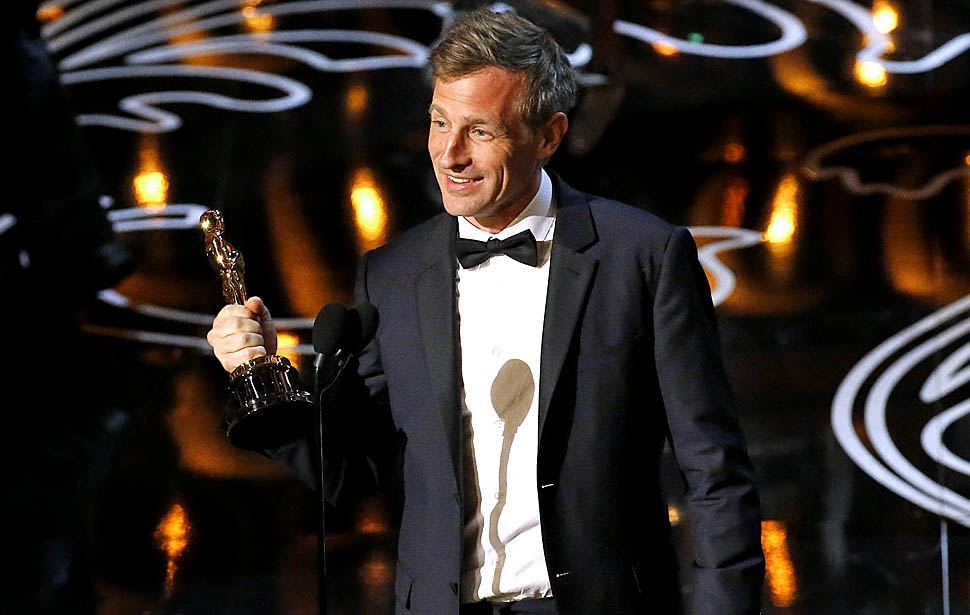
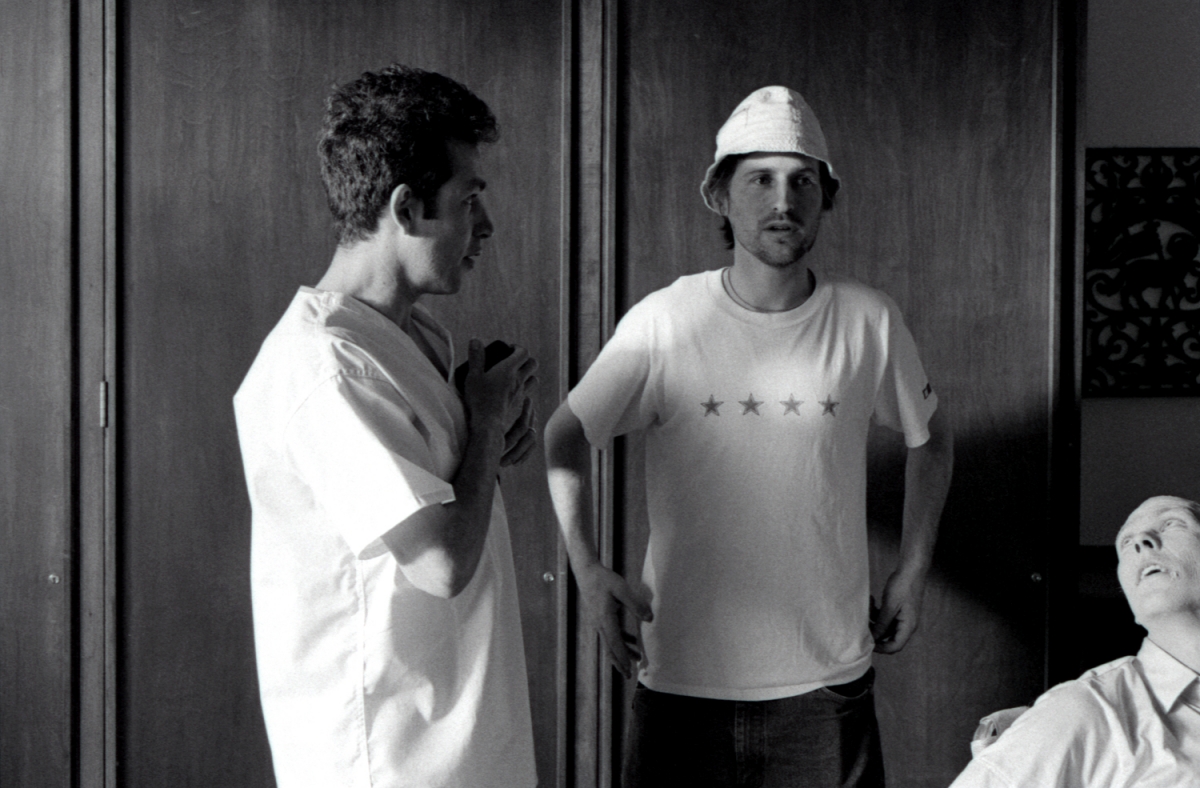
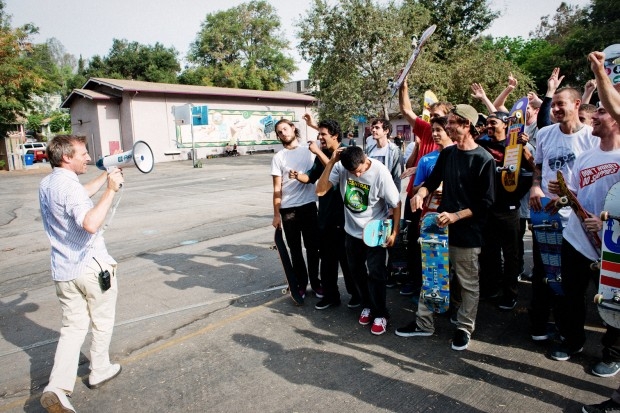
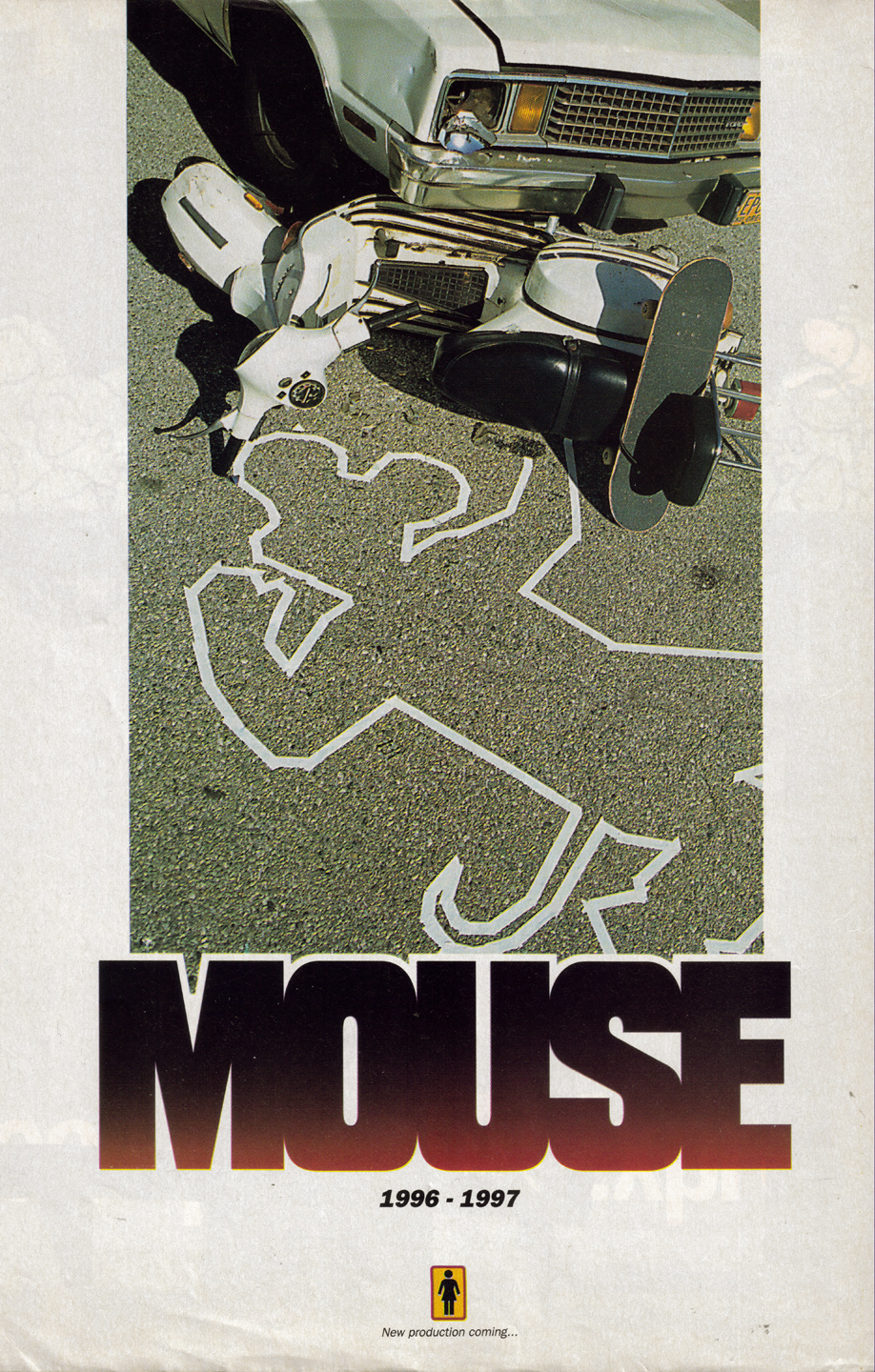
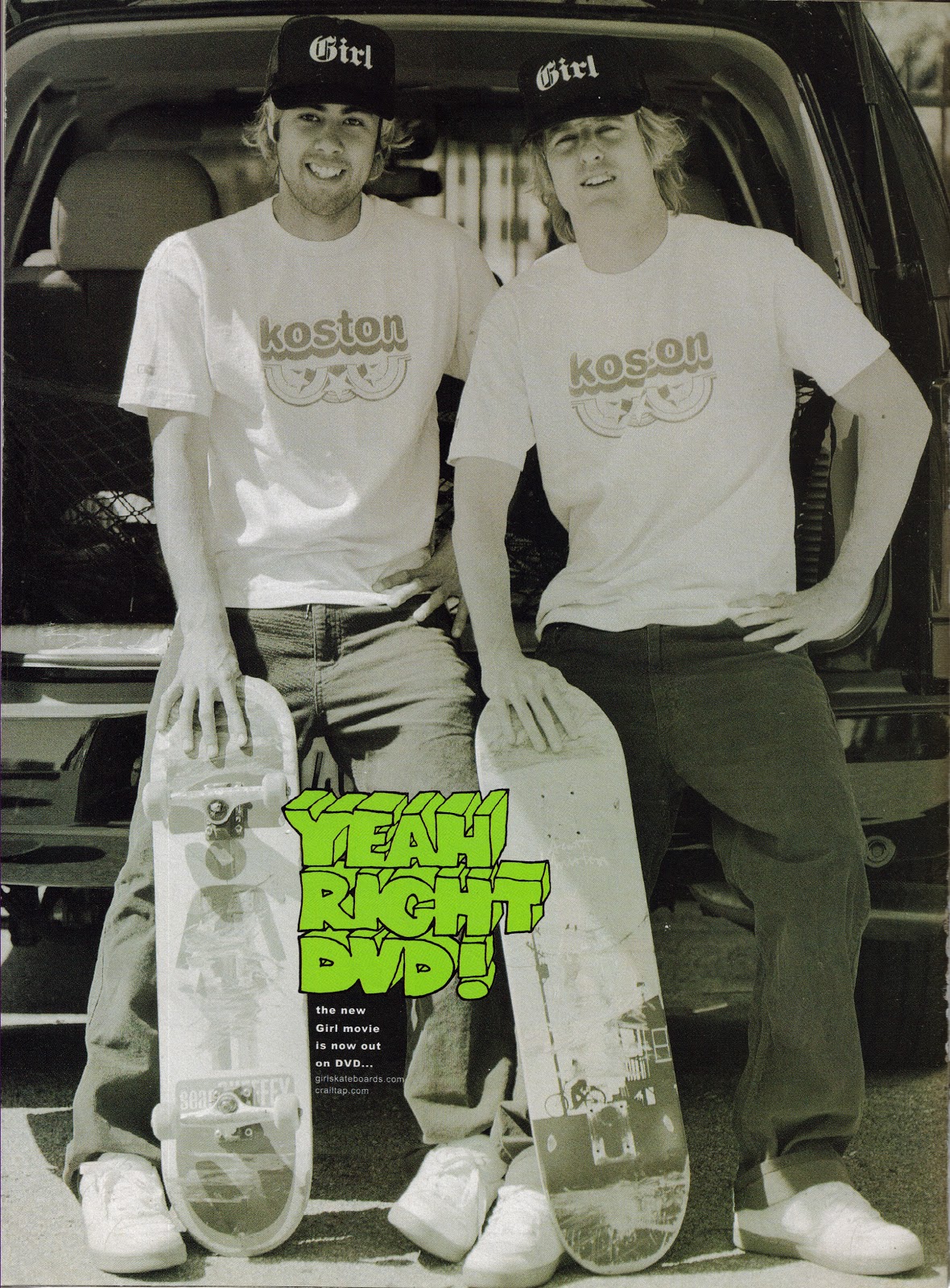





1 comment
Steve jobs says:
Mar 30, 2015
cool